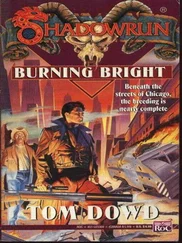Marcie hadn’t been listening to the radio, but now a psychology teacher from the community college was being interviewed on a call-in show. The man said the person setting the fires was, according to the statistics, a male and a loner. Sometimes there’s a sexual gratification in the act, he explained, or an inability to communicate with others except in actions, in this case destructive actions, or just a love of watching fire itself, an almost aesthetic response. But arsonists are always obsessive, the teacher concluded, so he won’t stop until he’s caught or the rain comes.
The thought came to her then, like something held underwater that had finally slipped free and surfaced. The only reason you’re thinking it could be him, Marcie told herself, is because people have made you believe you don’t deserve him, don’t deserve a little happiness. There’s no reason to think such a thing. But just as quickly her mind grasped for one.
Marcie thought of the one-night honeymoon in Gatlinburg back in April. She and Carl had stayed in a hotel room so close to a stream that they could hear the water rushing past. The next morning they’d eaten at a pancake house and then walked around the town, looking in the shops, Marcie holding Carl’s hand. Foolish, maybe, for a woman of almost sixty, but Carl hadn’t seemed to mind. Marcie told him she wanted to buy him something, and when they came to a shop called Country Gents, she led him into its log-cabin interior. You pick, she told Carl, and he gazed into glass cases holding all manner of belt buckles and pocketknives and cuff links, but it was a tray of cigarette lighters where he lingered. He asked the clerk to see several, opening and closing their hinged lids, flicking the thumbwheel to summon the flame, finally settling on one whose metal bore the image of a cloisonné tiger.
At the grocery store, Marcie took out her list and an ink pen, moving down the rows. Monday afternoon was a good time to shop, most of the women she knew coming later in the week. Her shopping cart filled, Marcie came to the front. Only one line was open and it was Barbara Hardison’s, a woman Marcie’s age and the biggest gossip in Sylva.
“How are your girls?” Barbara asked as she scanned a can of beans and placed it on the conveyor belt. Done slowly, Marcie knew, giving Barbara more time.
“Fine,” Marcie said, though she’d spoken to neither in over a month.
“Must be hard to have them living so far away, not hardly see them or your grandkids. I’d not know what to do if I didn’t see mine at least once a week.”
“We talk every Saturday, so I keep up with them,” Marcie lied.
Barbara scanned more cans and bottles, all the while talking about how she believed the person responsible for the fires was one of the Mexicans working at the poultry plant.
“No one who grew up around here would do such a thing,” Barbara said.
Marcie nodded, barely listening as Barbara prattled on. Instead, her mind replayed what the psychology teacher had said. She thought about how there were days when Carl spoke no more than a handful of words to her, to anyone, as far as she knew, and how he’d sit alone on the porch until bedtime while she watched TV, and how, though he’d smoked his after-supper cigarette, she’d look out the front window and sometimes see a flicker of light rise out of his cupped hand, held before his face like a guiding candle.
The cart was almost empty when Barbara pressed a bottle of hair dye against the scanner.
“Must be worrisome sometimes to have a husband strong and strapping as Carl,” Barbara said, loud enough so the bag boy heard. “My boy Ethan sees him over at Burrell’s after work sometimes. Ethan says that girl who works the bar tries to flirt with Carl something awful. Of course Ethan says Carl never flirts back, just sits there by himself and drinks his one beer and leaves soon as his bottle’s empty.” Barbara finally set the hair dye on the conveyor. “Never pays that girl the least bit of mind,” she added, and paused. “At least when Ethan’s been in there.”
Barbara rang up the total and placed Marcie’s check in the register.
“You have a good afternoon,” Barbara said.
On the way back home, Marcie remembered how after the wood had been cut and stacked she’d hired Carl to do other jobs-repairing the sagging porch, then building a small garage-things Arthur would have done if still alive. She’d peek out the window and watch him, admiring the way he worked with such a fixed attentiveness. Carl never seemed bored or distracted. He didn’t bring a radio to help pass the time and he smoked only after a meal, hand-rolling his cigarette with the same meticulous patience as when he measured a cut or stacked a cord of firewood. She’d envied how comfortable he was in his solitude.
Their courtship had begun with cups of coffee, then offers and acceptances of home-cooked meals. Carl didn’t reveal much about himself, but as the days and then weeks passed Marcie learned he’d grown up in Whiteville, in the far east of the state. A carpenter who’d gotten laid off when the housing market went bad, he’d heard there was more work in the mountains so had come west, all he cared to bring with him in the back of his pickup. When Marcie asked if he had children, Carl told her he’d never been married.
“Never found a woman who would have me,” he said. “Too quiet, I reckon.”
“Not for me,” she told him, and smiled. “Too bad I’m nearly old enough to be your mother.”
“You’re not too old,” he replied, in a matter-of-fact way, his blue eyes looking at her as he spoke, not smiling.
She expected him to be a shy awkward lover, but he wasn’t. The same attentiveness he showed in his work was in his kisses and touches, in the way he matched the rhythms of his movements to hers. It was as though his long silences made him better able to communicate in other ways. Nothing like Arthur, who’d been brief and concerned mainly with satisfying himself. Carl had lived in a run-down motel outside Sylva that rented by the hour or the week, but they never went there. They always made love in Marcie’s bed. Sometimes he’d stay the whole night. At the grocery store and church there were asides and stares. Preacher Carter, who’d sent Carl to her in the first place, spoke to Marcie of “proper appearances.” By then her daughters had found out as well. From three states away they spoke to Marcie of being humiliated, insisting they’d be too embarrassed to visit, as if their coming home was a common occurrence. Marcie quit going to church and went into town as little as possible. Carl finished his work on the garage but his reputation as a handyman was such that he had all the work he wanted, including an offer to join a construction crew working out of Sylva. Carl told the crew boss he preferred to work alone.
What people said to Carl about his and Marcie’s relationship, she didn’t know, but the night she brought it up he told her they should get married. No formal proposal or candlelight dinner at a restaurant, just a flat statement. But good enough for her. When Marcie told her daughters, they were, predictably, outraged. The younger one cried. Why couldn’t she act her age, her older daughter asked, her voice scalding as a hot iron.
A justice of the peace married them and then they drove over the mountains to Gatlinburg for the weekend. Carl moved in what little he had and they began a life together. She thought that the more comfortable they became around each other the more they would talk, but that didn’t happen. Evenings Carl sat by himself on the porch or found some small chore to do, something best done alone. He didn’t like to watch TV or rent movies. At supper he’d always say it was a good meal, and thank her for making it. She might tell him something about her day, and he’d listen politely, make a brief remark to show that though he said little at least he was listening. But at night as she readied herself for bed, he’d always come in. They’d lie down together and he’d turn to kiss her good night, always on the mouth. Three, four nights a week that kiss would linger and then quilts and sheets would be pulled back. Afterward, Marcie would not put her nightgown back on. Instead, she’d press her back into his chest and stomach, bend her knees, and fold herself inside him, his arms holding her close, his body’s heat enclosing her.
Читать дальше












